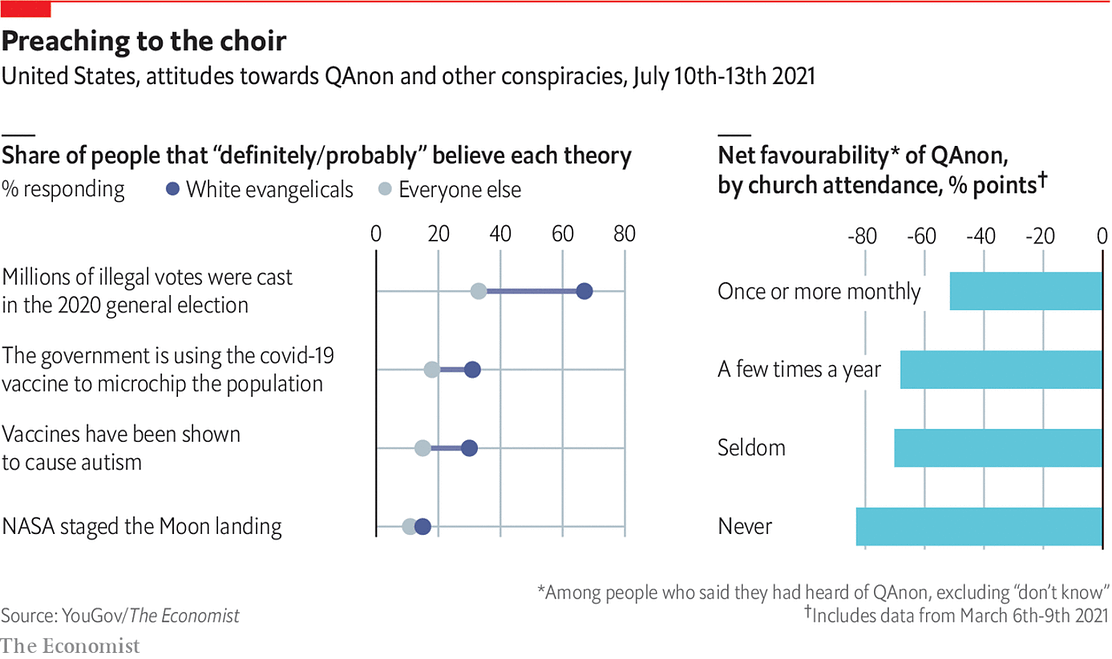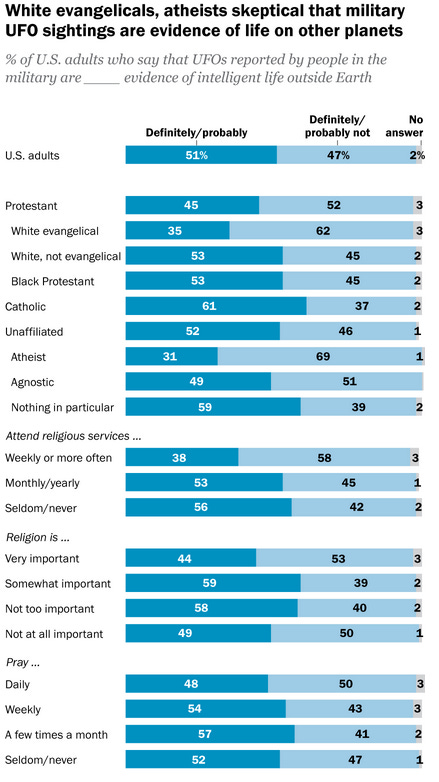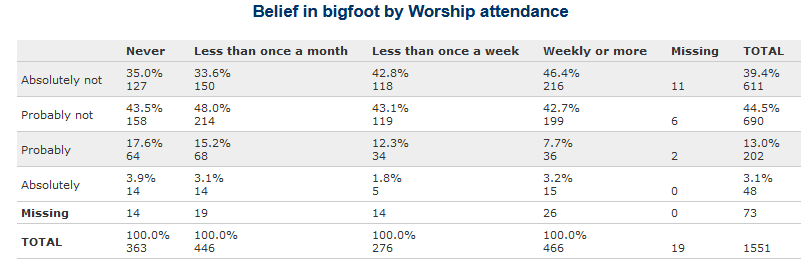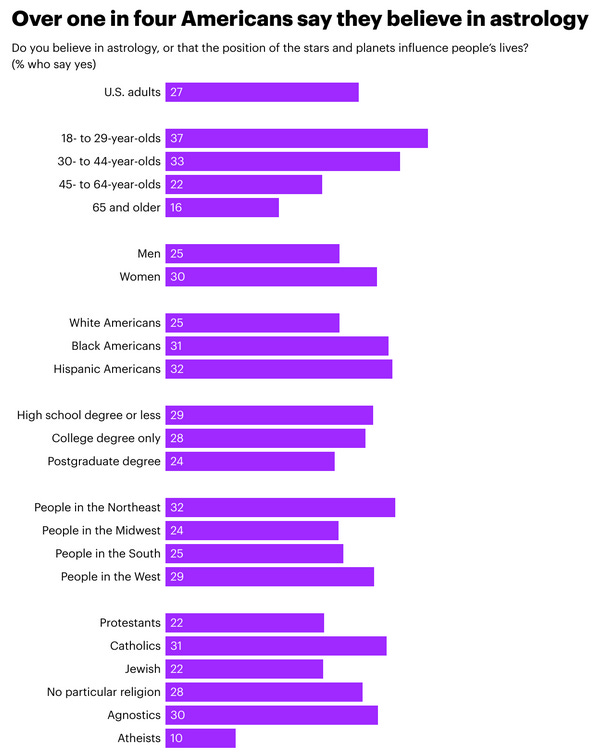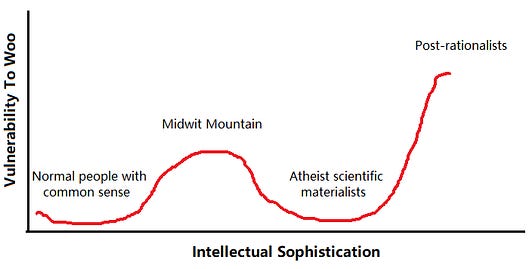Will Nonbelievers Really Believe Anything?
There’s a popular saying among religious apologists:
Big talk, although I notice that this is practically always attributed to one of GK Chesterton or CS Lewis, neither of whom actually said it. If you’re making strong claims about how everybody except you is gullible, you should at least bother to double-check the source of your quote. Still, it’s worth examining as a hypothesis. Are the irreligious really more likely to fall prey to woo and conspiracy theories?  This Economist article examined the question and concluded the opposite. See especially this graph: “White evangelicals” are more likely to believe most measured conspiracy theories, and churchgoers were more likely to believe in QAnon in particular. There’s an obvious confounder here: the authors are doing the usual trick where they cherry-pick right-wing examples of something bad, show that more right-wingers are in favor of them, then conclude that Science Has Proven Right-Wingers Are Bad. QAnon, illegal votes, and COVID microchips are inherently right wing conspiracy theories; vaccines/autism has probably become right-coded post-COVID. Only the moon landing seems politically neutral, and it’s hard to tell if there’s a real difference on that one. So this just tells us that white evangelical church-goers are further right than other people, which we already know. These data still deflate some more extreme claims about religion being absolutely protective against conspiracy theories. But I was interested in seeing how people of different faiths related to politically neutral conspiracies. Here’s Pew on who believes in UFOs: The two most skeptical groups are . . . evangelicals and atheists. Quite the Baptists and Bootleggers alliance. Here’s belief in Bigfoot by religion and worship attendance I would ignore the Absolutely category, which is too small to have a good sample size, and look at who says “Absolutely Not” vs. weaker versions (in theory some groups could be open-minded and less likely to take strong positions on either side, but it doesn’t look like that happens here). People of “none” religion are less likely than any religion except Jews to believe in Bigfoot. Somehow at the same time, the less often you go to church, the more likely to believe in Bigfoot you are. And here’s astrology: We find a similar pattern. Agnostics and people with “no particular religion” are more likely than Protestants to believe in astrology, but outright atheists are much less likely. I would have liked to look into JFK and 9/11 conspiracies, but I couldn’t find great data. There is a Zogby poll which says 47% of evangelicals believed Bush knew about 9/11, but different sources give the base rate as either 41% or 49%, which makes it hard to tell if evangelicals are higher or lower. Overall I think these results support the fake Chesterton/Lewis quote, but in a weird and unexpected way. Strongly religious people and outright atheists were usually less likely to believe in conspiracy theories. The conspiracy believers were usually somewhere in the middle: either weakly religious people who never went to church, or vague agnostics. One possible explanation is that people with any coherent worldview are smarter or at least more intellectual than people who don’t care. I don’t think this can fully explain these results: although following the logical implications of Christian belief would make you go to church a lot, I don’t think this is why most frequent churchgoers do it. Most churchgoers do it because they come from families and areas where going to church is expected. Another possible explanation is that people with coherent worldviews already have strong opinions on what’s true, making them closed-minded against conspiracy theories. For example, if God created humans in the Garden of Eden, that doesn’t leave a lot of room for aliens and UFOs. Or, since atheists believe everything works through purely physical and natural forces, that doesn’t leave a lot of room for astrology. But this one doesn’t quite work either: neither scientific materialism nor Biblical literalism precludes Bigfoot. God and/or Evolution created all sorts of weird ape species; why shouldn’t there be one more? Maybe there’s not a single explanation. Maybe the religious people don’t do it because it sounds too much like consorting with demons, and the atheists don’t do it because they’re already pre-selected for skepticism and not believing in things? I don’t know. Still, if someone tells you that people who don’t believe in God will believe in anything, please politely correct them that this is only true until the point where they 100% accept scientific materialist atheism, at which point they go back to mostly not being that gullible again. You’re a free subscriber to Astral Codex Ten. For the full experience, become a paid subscriber. |
Older messages
Why Not Slow AI Progress?
Monday, August 8, 2022
Machine Alignment Monday 8/8/22
Open Thread 236
Monday, August 8, 2022
...
Your Book Review: Exhaustion
Friday, August 5, 2022
Finalist #13 in the Book Review Contest
Absurdity Bias, Neom Edition
Thursday, August 4, 2022
...
Slightly Against Underpopulation Worries
Thursday, August 4, 2022
...
You Might Also Like
Rocket’s $1.75B deal to buy Redfin amps up competition with Zillow
Monday, March 10, 2025
GeekWire Awards: Vote for Next Tech Titan | Amperity names board chair ADVERTISEMENT GeekWire SPONSOR MESSAGE: A limited number of table sponsorships are available at the 2025 GeekWire Awards: Secure
🤑 Money laundering for all (who can afford it)
Monday, March 10, 2025
Scammers and tax evaders get big gifts from GOP initiatives on crypto, corporate transparency, and IRS enforcement. Forward this email to others so they can sign up 🔥 Today's Lever story: A bill
☕ Whiplash
Monday, March 10, 2025
Amid tariff uncertainty, advertisers are expecting a slowdown. March 10, 2025 View Online | Sign Up Marketing Brew Presented By StackAdapt It's Monday. The business of sports is booming! Join top
☕ Splitting hairs
Monday, March 10, 2025
Beauty brand loyalty online. March 10, 2025 View Online | Sign Up Retail Brew Presented By Bloomreach Let's start the week with some news for fans of plant milk. A new oat milk, Milkadamia Flat
Bank Beliefs
Monday, March 10, 2025
Writing of lasting value Bank Beliefs By Caroline Crampton • 10 Mar 2025 View in browser View in browser Two Americas, A Bank Branch, $50000 Cash Patrick McKenzie | Bits About Money | 5th March 2025
Dismantling the Department of Education.
Monday, March 10, 2025
Plus, can someone pardoned of a crime plead the Fifth? Dismantling the Department of Education. Plus, can someone pardoned of a crime plead the Fifth? By Isaac Saul • 10 Mar 2025 View in browser View
Vote now for the winners of the Inbox Awards!
Monday, March 10, 2025
We've picked 18 finalists. Now you choose the winners. ͏ ͏ ͏ ͏ ͏ ͏ ͏ ͏ ͏ ͏ ͏ ͏ ͏ ͏ ͏ ͏ ͏ ͏ ͏ ͏ ͏ ͏ ͏ ͏ ͏ ͏ ͏ ͏ ͏ ͏ ͏ ͏ ͏ ͏ ͏ ͏
⚡️ ‘The Electric State’ Is Better Than You Think
Monday, March 10, 2025
Plus: The outspoken rebel of couch co-op games is at it again. Inverse Daily Ready Player One meets the MCU in this Russo Brothers Netflix saga. Netflix Review Netflix's Risky New Sci-Fi Movie Is
Courts order Trump to pay USAID − will he listen?
Monday, March 10, 2025
+ a nation of homebodies
Redfin to be acquired by Rocket Companies in $1.75B deal
Monday, March 10, 2025
Breaking News from GeekWire GeekWire.com | View in browser Rocket Companies agreed to acquire Seattle-based Redfin in a $1.75 billion deal that will bring together the nation's largest mortgage
